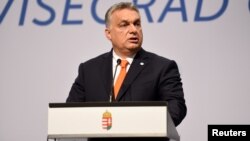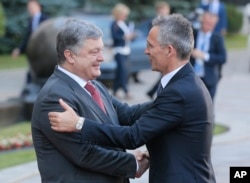The NATO alliance has no plans to abandon its strong support for Ukraine despite concerns from the Hungarian government, which became public this week.
On Monday, Ukrainian news outlet Evropeiska Pravda reported that the Hungarian Ministry of Foreign Affairs issued a missive to NATO Secretary General Jens Stoltenberg stating that Prime Minister Viktor "Orban is planning to vote against any document that will be proposed for adoption by the members of the Alliance after the meeting with the Ukrainian and Georgian leaders."
According to the Pravda report, the letter was sent just days after a Ukrainian-Hungarian ministerial where officials from both countries had largely resolved a dispute over a Ukrainian law on education that stood in violation of the Venice Commission, a legal advisory body to the Council of Europe.
If Ukraine agreed to come into compliance with the law, Hungarian officials said, they would unblock Ukraine's efforts to join NATO. As NATO member since 1999, Hungary's permanent delegation can veto accession efforts by aspiring NATO member countries, such as Ukraine.
A Hungarian foreign ministry spokesman elaborated in a letter to VOA Thursday, saying Hungary was originally the "loudest supporter" of Ukraine's integration into European and trans-Atlantic institutions.
"Nevertheless, Ukraine has adopted a new law, which is completely incompatible with European values and heavily violates minority rights; depriving the Hungarian minority of their already existing, acquired rights," the letter said.
"Therefore, it must be said that Ukraine cannot be taken seriously as a country approaching the European Union and NATO with the intention of joining them. For these reasons, the Hungarian Government will be maintaining its veto of negotiations between NATO and Ukraine, until we receive suitable legal guarantees that the rights of Transcarpathian Hungarians will not be infringed upon."
NATO officials on Tuesday confirmed possession of the original letter to the alliance, but directed queries about its contents to Budapest.
"The Hungarian government has written to NATO Secretary General Jens Stoltenberg on the topic of Ukraine," a NATO spokesperson confirmed to VOA's Ukrainian Service. "For any queries about the content, I refer you to the Hungarian authorities.
"NATO provides strong political and practical support to Ukraine and there are no plans for this to change," the alliance spokesman added. "Over the last years, Ukraine has implemented substantial reforms in the security and defense sector, but also in areas including health, education and welfare. It is important that Ukraine continues on the path of reforms."
Although it was not clear whether the Hungarian government's letter sought to block Ukrainian participation in the summit, the NATO official wrote: "Ukraine will take part in next week's NATO summit. The summit formats will be announced shortly. We expect that allied leaders will recognize the Ukraine is making and strongly commit to continue to provide political and practical support."
Ivanna Klympush-Tsintsadze, Ukraine's vice prime minister for European and Euro-Atlantic integration, told VOA that she remains optimistic that NATO will seek continued cooperation with Ukraine.
"We meet with the alliance to discuss common challenges, to share the achievements in reform of our security and defense sector, to outline directions for further enhanced cooperation," she told VOA. "We also hope that Ukraine’s constructive appeal to Hungary to sort out the national minorities' education language issue in Ukraine [can be addressed] on a bilateral level, as opposed to dealing with it in multilateral formats. ...
"We also believe that one of the allies has decided actually to take NATO hostage in a bilateral dispute with a Ukraine [that is actively] fighting [Russian] aggression only weakens the alliance," Klympush-Tsintsadze said.
NATO formally invited Ukrainian President Petro Poroshenko to the upcoming summit last month in a historic move that circumvented Hungarian efforts to block meetings of the NATO-Ukraine Commission, allowing NATO allies to hold talks with Poroshenko outside the format of the commission.
The summit is currently slated for July 11-12 in Brussels.
This story originated in VOA's Ukrainian Service. Bogdan Tsioupine in London contributed to this report. Ani Chkhikvadze from VOA's Georgian Service also contributed.
An earlier version of this report incorrectly referred to a NATO official as a “top” official, and mistakenly said a letter from the Hungarian government to NATO was sent by Hungarian Prime Minister Viktor Orban. VOA regrets the errors.





